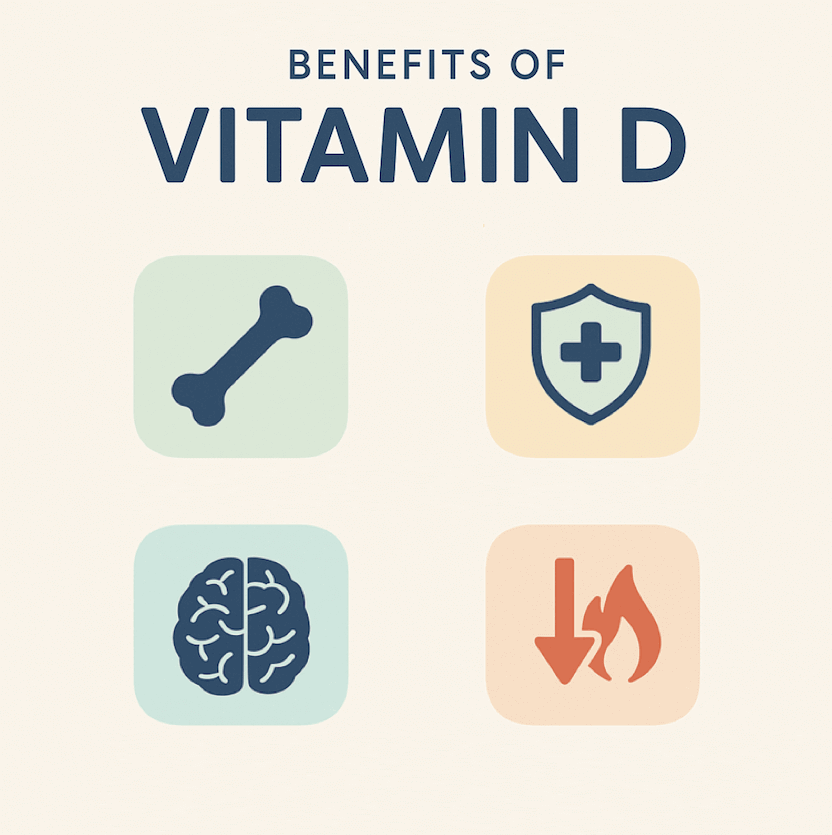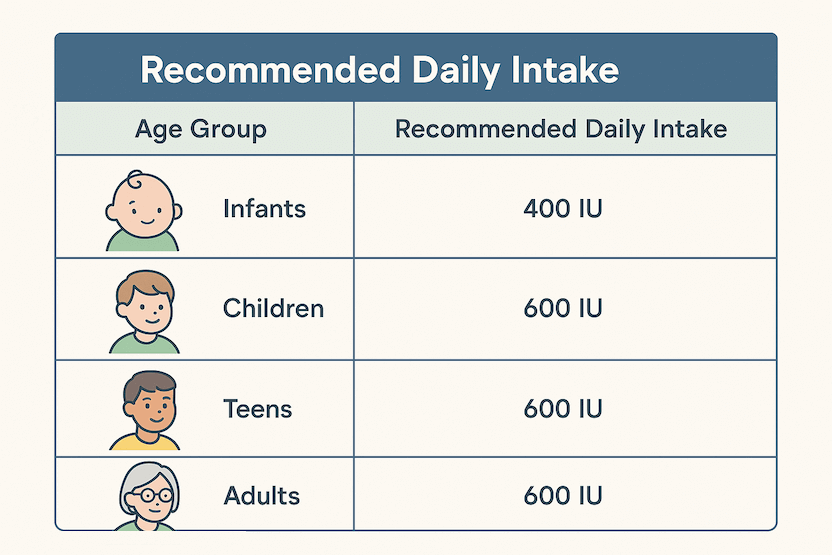Last update: July 2, 2025
5 minute read
Vitarx Vitamin D3 Overview: How Does This Supplement Help Your Immune Health and Overall Wellbeing?
Explore the important benefits of Vitamin D3, how VitaRx's supplement stands apart in purity, dosage flexibility, and ease of subscription.

By Derick Rodriguez, Associate Editor
Edited by Dr. Dimitar Marinov, MD, RDN, PhD

Did you know nearly 20% of Americans hover in the danger zone of inadequate vitamin D levels, despite plentiful sunlight and fortified foods?
If you're banking on daily sun exposure alone, you're missing the hidden factors—like skin tone, age, and geographic location—that can greatly impact your body's natural production of the very important vitamin D3.
Add dietary limitations or the inability to consistently eat vitamin D-rich foods, and it's easy to see why supplements become a useful ally.
VitaRx Vitamin D3, formulated to support vitamin D absorption and contribute to bone health, immune function, and overall well-being, can help fill nutritional gaps.
Key takeaways
- Supports core health: Vitamin D3 supports bone health and may contribute to immune function and mood regulation.
- Personalizable dosage: Tailor intake to your unique needs.
- Subscription convenience: Lower cost and automatic delivery.
Understanding vitamin D
Vitamin D is an essential nutrient best known for supporting bone health, and emerging research suggests it may also influence immune function, mood and more. Known as the "sunshine vitamin," vitamin D is made by the body in response to sunlight, though it can also be gotten from foods and supplements.

Vitamin D comes in two main forms: D2 and D3. While both are helpful, vitamin D3 is the preferred form for supplementation because it raises blood levels of 25-hydroxyvitamin D—the standard measure of vitamin D status—more effectively than D2.
Here’s a side-by-side comparison:
Vitamin D2 (Ergocalciferol) | Vitamin D3 (Cholecalciferol) | |
|---|---|---|
Source | Plant-based | Animal-based (and sun) |
Potency | Lower | Higher |
Duration | Shorter-acting | Longer-lasting |
Vitamin D obtained from sun exposure, diet, or supplements is biologically inactive and must be changed by the liver and kidneys to its active form. Without enough vitamin D, bones can become thin, brittle, or misshapen, and risks of diseases like osteomalacia in adults or rickets in children go up.
But wait—does all sunlight exposure give the same amount of vitamin D? Actually, time of day, skin tone, age, and geographic location, and even sunscreen use all greatly affect how well your body makes vitamin D from sunlight.
Despite its importance, vitamin D deficiency is still common in the United States, with nearly 20% of the population at risk for inadequacy and 5% at risk for deficiency. (This shows why choosing a dependable vitamin D3 supplement, like VitaRx, is so important for many people)
Who needs extra vitamin D3?
Certain groups are more likely to have vitamin D deficiency, like:
- People with limited sun exposure (northern climates or diligent sunscreen users)
- People with darker skin tones (higher melanin lowers production)
- Breastfeeding women
- Older adults
- Individuals with malabsorption conditions
Vegetarians, vegans, people with obesity, and those with GI disorders (e.g., Crohn's, celiac) may also benefit from supplementation.
Common signs of vitamin D deficiency
Watch for these nonspecific symptoms:
- Fatigue
- Bone or muscle pain
- Frequent infections
- Slow wound healing

Recommended daily intake
The recommended daily intake of vitamin D varies by age and situation. For most adults up to 70 years old, the recommended amount is 600 IU (15 mcg), and 800 IU (20 mcg) for those over 70. Pregnant or lactating women should aim for 600 IU (15 mcg). For infants and children, 400–600 IU is usually enough.
Demographic | Recommended daily intake |
|---|---|
Infants 0-12 months | 400 IU (10 mcg) |
Children 1-18 years | 600 IU (15 mcg) |
Adults up to 70 years | 600 IU (15 mcg) |
Adults over 70 years | 800 IU (20 mcg) |
Pregnant/lactating women | 600 IU (15 mcg) |
But what if your blood test shows low vitamin D even when following these guidelines? Your doctor may suggest temporarily higher doses.
VitaRx Vitamin D3 review: What makes it different?
VitaRx offers vitamin D3 supplements made to improve absorption and accommodate variable dosage needs.
Each capsule delivers 25 mcg (1,000 IU) of Vitamin D3—paired with 45 mcg of Vitamin K2—making it the perfect daily supplement for anyone looking to support their immune system, strengthen bones, and fill the sunshine gap.
Why you’ll love it:
- Optimal strength: 1,000 IU of high-quality D3, sourced from lanolin
- With vitamin K2: 45 mcg MK-4 for enhanced bone and cardiovascular support
- Easy, once-a-day: Just one capsule fits perfectly into your daily routine
- Ideal for: Busy professionals, indoor lifestyles, and anyone needing an immunity or bone health boost
VitaRx Vitamin D3 stands out for its quality, strength, and convenience, making it a smart choice for maintaining healthy vitamin D levels and overall well-being.
— Dr. Dimitar Marinov, MD, RDN, PhDOpt for personalized D₃ packs formulated with cholecalciferol (D₃), synergists like K₂ and magnesium, and GMP-certified purity; base your choice on third-party testing and individual 25-hydroxyvitamin D levels to ensure safe, targeted support for immunity, bone strength, and overall well-being.
Frequently asked questions (FAQ)
Here are some of the most frequently asked questions about VitaRx Vitamin D3.
Final thoughts
With vitamin D3 supporting bones and possibly playing a role in healthy immunity and mood, keeping your levels in the optimal range is essential. Regular screening plus a quality supplement like VitaRx can bridge gaps left by diet or limited sun.
We recommend testing your vitamin D status and tailoring intake accordingly. Have you checked your vitamin D levels lately?
Sources and references
Editor

Derick Rodriguez
Derick Rodriguez focuses on editing health and wellness-related content. With over half a decade of experience in the digital realm, Derick has developed a unique skill set that bridges the gap between complex health concepts and accessible, user-friendly communication. His approach is deeply rooted in leveraging personal experiences and insights to illuminate the nuances of health and wellness topics, making them more approachable and empowering readers with knowledge and confidence.
Fact checker

Dr. Dimitar Marinov
Dr. Marinov has years of experience in scientific research and preventive and clinical medicine. His publications in peer-reviewed journals are on nutritional status, physical activity, and musculoskeletal disorders among adolescents.
At VitaRx, we're not just passionate about our work — we take immense pride in it. Our dedicated team of writers diligently follows strict editorial standards, ensuring that every piece of content we publish is accurate, current, and highly valuable. We don't just strive for quality; we aim for excellence.
Related posts
While you're at it, here are some other relevant articles you might be interested in.

Get your personalized vitamin recommendations in less than
5 minutes.
Get your personalized vitamin recommendations in less than
5 minutes.






